[UPDATED] The Future of Messenger Marketing: What It Is, Where It’s Going, & Why the Future is So Very Bright for Businesses in 2019
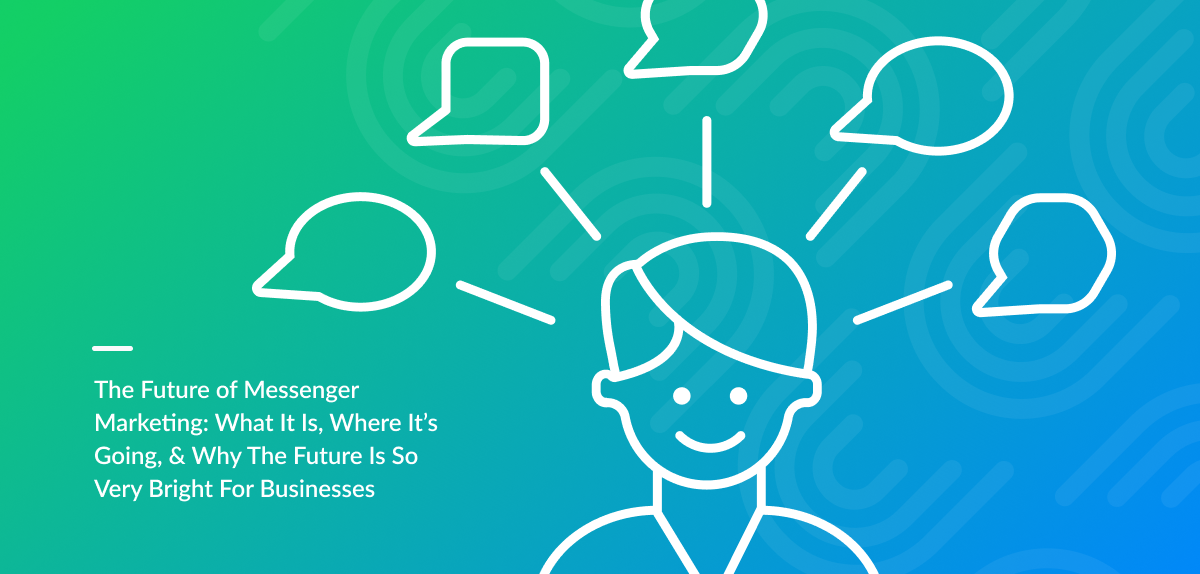
If there’s one thing all business owners can agree on, it’s that you have to approach your customers in the places where they’re already hanging out.
If your customers are sports-loving guys who watch ESPN and the NFL Channel, you wouldn’t advertise to them on HGTV and Lifetime, would you?
Of course not.
You’d put your ads on sports networks where your target market will see them.
And that, in a nutshell, is why Messenger Marketing is set to become the world’s single biggest marketing channel in the next 5-7 years.
Messenger Marketing – noun – the act of leveraging mobile, chat platforms to facilitate conversations and commerce with prospects and customers.
There’s no denying the fact that we’re moving away from emails, SMS and phone calls. More and more we’re using mobile-friendly messenger apps like Facebook Messenger, iMessage, and WhatsApp to keep in touch with friends, family, and even businesses.
It’s the quickest, easiest, and most convenient way to reach someone.
Is it any wonder, then, why Facebook Messenger Marketing is the most exciting new marketing channel to come by in a long, long time?
It’s been over a year since I first published this post. And considering the rapid speed at which Messenger Marketing is growing & evolving, that’s a long time.
So today I’m going to update this again with the most recent changes and developments we’re seeing in Messenger Marketing.
It’s only been a year, but many of the predictions we made back in 2017 are already happening. And as a result, we can see even further down the horizon to what the future holds in 2019 and beyond.
Here’s what I’m going to do. First I want to go through some of the predictions we made last year that are already happening, right now. After that I’m going to make some new predictions about what the future holds for Messenger marketing.
But first, let’s just go through a quick reminder of why Messenger is such an exciting platform for marketers. This is important because it really serves as the foundation for everything that follows.
Why Messenger Marketing Is Growing So Fast
If there’s one thing that has always been true in business, it’s that companies tend to gravitate toward the communication channels that consumers are already using.
That just makes sense, right?
Back when people communicated through hand-written letters, direct mail was born. When phones became common, so did telemarketing. The rise of email led to the rise of email marketing.
And today?
Today people communicate on Messenger apps. And over the past few years, it’s fair to say the popularity of these apps has simply skyrocketed:
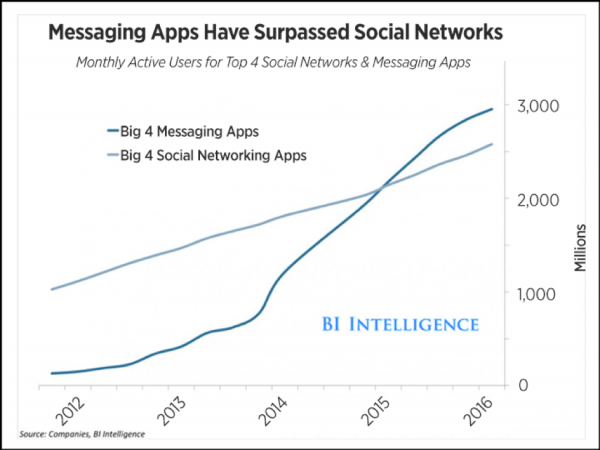
Source: https://blog.bufferapp.com/messaging-apps
The steepness of that curve should tell you something: messaging apps have a naturally huge appeal. They’re too easy and intuitive not to use.
The trend isn’t stopping anytime soon. Here’s the estimated growth of Messaging apps over the next several years:
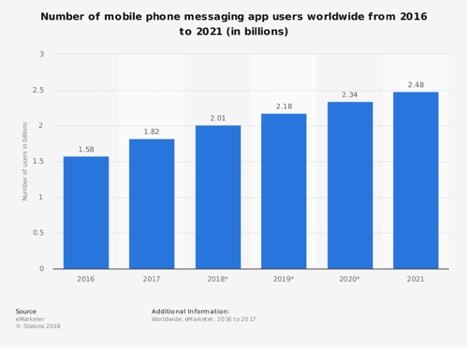
As you can see in this next chart, text (AKA messaging) is the overwhelmingly preferred method of communication for people age 18-44 (AKA the future generations of consumers):
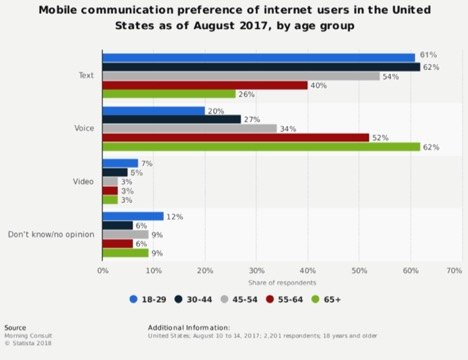
We can get an idea of just how much is possible by taking a look at one country where the future of Messenger Marketing has already happened—China.
(RELATED: The 3 Critical Rules of Leveraging Facebook Messenger Marketing in Your Customer Relationships)
The Meteoric Rise of Messengers: The China Case Study
I’ve said before that in the next 5-7 years, Messenger Marketing is going to capture 80% of all B2C communication.
It’s going to replace email, websites, phone calls, and SMS as the primary way businesses communicate with customers. It’s not going to be “just another channel.”
It’s going to be THE channel.
And if you’re skeptical about any of this, look no further than China—where this exact thing has already happened.
In China, over 900 million people use WeChat each month, making it the most widely used app in the country. It’s the dominant way people communicate, pushing SMS and email to the sidelines—even at work, where many employees use WeChat for business communications (instead of email). The app allows for free video calls, easy sharing of large files, and instant group chats. Instead of exchanging business cards, you simply use WeChat to scan someone’s QR code and snag their contact information.
It’s done more than that, though.
In many cases WeChat has actually replaced websites altogether. Many bloggers in China have turned to WeChat as their primary channel for distributing content, generating massive readership without ever even posting to a traditional blog.
Did I mention it’s also a revenue monster—largely replacing cash and credit cards? WeChat Pay is everywhere in China: you can use it to pay for purchases at physical and online stores, request taxis, order movie tickets, and even buy a drink from a vending machine.
According to the 2017 WeChat User Report, 87-94% of users in China pay for offline purchases using WeChat…compared to 38-51% using cash and 29-36% using debit/credit cards:
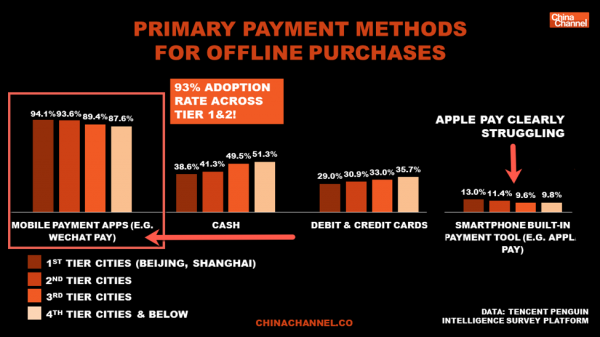
Source: https://chinachannel.co/1017-wechat-report-users/
Statistics like this are really cool because they give a glimpse of what’s possible, of what’s coming, in the rest of the world. And when you combine that with all the capabilities of Facebook…all the rich data and targeting options hiding in our profiles…
You can see why the future of Messenger Marketing is so exciting.
Part 1: Messenger Marketing Predictions That Are Happening Right Now
To be able to understand where Messenger Marketing is going, first you have to understand where it came from and where it is today.
Here are some of the Messenger Marketing predictions we made that are already happening right now.
Messenger Marketing Grows Like Wildfire
We already established that the use of Messaging apps is growing like crazy. But what about Messenger Marketing? Is that growing, too?
We predicted that this would be the fastest-growing marketing channel by a mile. And we weren’t disappointed.
Being one of the leading Messenger Marketing tools in the world, we probably have as much or more data on this than anyone else in the United States. And here’s a glimpse of what we’ve seen happen over the past few months.
To give some context, we founded ManyChat in 2015…although it wasn’t until April 2016 that Facebook opened their Messenger API. So ManyChat has only existed as a Facebook Messenger Marketing tool for about 2 and a half years.
That’s not very long for a company to be around, but we’re already privileged to power over 400,000 Facebook pages in over 100 countries around the world. And even more exciting is the fact that we recently crossed the 3 billion message/month threshold.
That’s 3 billion messages sent through ManyChat every month.
As a result, our team has grown from 3 people to 45 and counting. (Yes, we’re hiring right now.)
So as Messaging apps explode in popularity, so does Messenger Marketing. And it will continue to grow for years and years to come. It won’t be long before millions of companies are using Messaging apps to connect with billions of customers around the world.
The Beginnings of Messenger Commerce
In 2018, we also saw the birth of Messenger Commerce (or Conversational Commerce as some are calling it). Today, people around the world are buying products and services directly through Messenger—and this is another trend that is certain to keep growing rapidly.
We announced the ability to accept payments inside ManyChat several months ago. And we’re constantly working to improve this part of ManyChat, by rolling out more upgrades, features, and support for additional currencies and integrations.
This is going to be a BIG part of Messenger Marketing going forward, and this feature is only going to get more robust over time.
If you want to see what’s possible, look no further than the kind of thing that’s happening on WeChat in China:
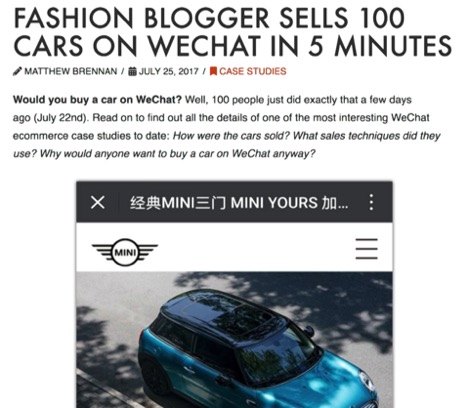
Influencer sells cars through a messaging app. So yes, you can sell products through Messenger—even really expensive ones. The highest price-point that’s been sold on ManyChat so far (that I know of) is $80,000.
And we’re just getting started.
Related: How Chatbots are Changing the eCommerce Industry
Messenger Marketing Is Expanding To Even More Platforms
If you want to do Messenger Marketing anyplace outside of China, right now, you’re pretty much limited to using Facebook Messenger as your platform.
But not for long.
WhatsApp has opened their API and is in private beta, with plans to open their API publicly in 2019. You can 100% expect that ManyChat will be one of the first platforms to integrate with WhatsApp.
iMessage is following suit with the launching of Business Chat. They’re also opening up their API, and once again—ManyChat will integrate with it.
Finally, Android Messages. If you haven’t heard of RCS, it stands for “Rich Communication Services.” Basically, Google is trying to make this the successor to text messaging (SMS).
Imagine if SMS could do everything that Facebook Messenger can do—sending beautiful messages with buttons, images, links, and more. That’s the vision behind RCS.
This one is still a ways off, but if Google is able to get the new RCS standard approved, it could mean you’ll be able to reach an even wider audience with Messenger Marketing.
And when that day comes…guess what’s going to be one of the first platforms to integrate with it?
Messenger Marketing Is Becoming More Robust (New ManyChat Features)
This is a pretty obvious development to anyone who’s keeping up with our developments here at ManyChat. After all, we released 14 new features on the stage at our first-ever Conversations Conference in September.
But just in case, let me make this one clear:
Messenger Marketing is becoming a more robust marketing channel every day.
At first it was mostly text-based messages with the ability to add buttons, images, and videos. Most bots were fairly simple, and creating them was not especially easy or intuitive.
But now we have the Flow Builder. The Template Installation Wizard. The Tag Manager.
You can accept payments in Messenger. Randomize elements. Save the date/time of an action. Compare custom fields to other custom fields.
And our list of integrations is growing all the time, and has recently been expanded to include MailChimp, Facebook ads, and Google Sheets.
All of this means that marketers and companies are able to create chatbots that are more advanced, more engaging, and more functional. And that’s only going to make this an even more effective marketing platform in 2019 and beyond.
A Passionate Community of Marketers Is Developing Around Messenger Marketing
It’s not just consumers who love Messenger Marketing. It turns out that marketers love it, too!
And here at ManyChat, we’re doing our best to help foster a sense of community to bring these awesome people together. Here are some of the steps we’ve taken to do just that:
- We hosted the first-ever Messenger Marketing conference in the world in September. This was an amazing event that brought together many of the brightest marketers in the world to share their experiences and successes using ManyChat.
- We’re running a chatbot-building contest and will be launching a template store in the future. We believe this will help everyone by making it easier to find and leverage ready-made chatbot templates that have already been tested and proven to work in your industry.
- We’re also working on creating an Agency Partner Program, to make it easier for businesses to find a highly qualified Messenger Marketing agency to help them achieve the results they’re after.
I believe there’s one big reason why marketers are so excited about Messenger Marketing, and that’s because it WORKS.
And as one of the leading Messenger Marketing platforms in the world, we want to do our part to help bring our community together so we can all help businesses to build more meaningful relationships with their customers.
Part 2: What The Future Holds For Messenger Marketing
Those are some of the changes that are already taking place in Messenger Marketing. So what do we have to look forward to? What does the future hold?
Here are some predictions and changes you can expect to see coming to Messenger Marketing over the coming months and years.
The Future of Messenger Marketing
Let’s start with a vision of the future. As Messenger Marketing becomes more and more widespread, what kind of role will it play in our daily lives?
Well, imagine you’ve just spent a night at a hotel.
After you check out the next morning, you look at your phone and notice a notification from Facebook Messenger. You check it, and see that the hotel has sent you an automated message asking, on a 1-5 scale, how your stay was.
If you respond with a 1-3, the chatbot automatically asks you if anything was wrong and what they can do to improve. If you respond by telling them about the cockroaches you found under the bed, a customer service rep immediately replies to your message and credits you with a free stay.
If you respond with a 4-5, the chatbot automatically thanks you and gives you a link to leave a review online. They also tell you that, in the future, you can book a room by simply sending them a message with the date and type of room you want.
Doesn’t that sound quicker, easier, and more convenient for everyone involved? (Especially compared to the nightmare of opening graphic-heavy emails and navigating a poorly designed website on your phone?) And of course, the hotel chain will be able to store the data from this conversation in a central system and use it to provide better service in the future.
In short, scenarios like this are what the future holds for Messenger Marketing. More and more companies will continue to adopt chatbots to improve customer service and experience.
You’ll be able to set up chatbots that automatically send a message based on the last interaction the person had with your company—whether it was watching a video, making a purchase, viewing a certain product page on your website…you name it.
When someone needs to contact you, they won’t go to your website. Instead they’ll send you a Facebook message. Messenger will become your single point of interaction for customer service —the one place where they can easily reach you anytime they have a question, need help, or simply want to make a purchase (which they will also be able to do directly through Messenger).
Messenger Is Quickly Becoming A Mainstream Channel For Businesses
Right now, Messenger Marketing is still relatively new. Niche. Unknown to most people.
It hasn’t become a common mainstream channel of business communication and marketing.
At least…not yet. Fast-forward a year or two and that will all be different.
Everyone expects Messenger Marketing to continue its explosive growth. But from what we’re seeing in our own internal numbers (and we’ve got more data on this than just about everyone whose name isn’t “Facebook”), the Messenger Marketing space is going to be even BIGGER than anyone expects.
Keep in mind, it’s an ideal platform for conversation.
People already use it and trust it.
And it’s got some great benefits for companies who want to keep in touch with their customers.
The awesome thing about Messenger Marketing is that it’s so incredibly versatile. When people first started testing the waters in this space, most of us thought of Messenger as an alternative to email.
But as it continues to grow and develop, companies are starting to realize just how many other roles it’s capable of filling.
It can be an alternative to a mobile app. (One your users already have downloaded.)
It can be an alternative to live chat. (One that saves each customer’s conversations no matter when or where they send you a message.)
It can be an alternative to an ecommerce store. (One with a more intuitive and conversational shopping experience.)
The truth is, it won’t be long before Messenger can become an alternative to an entire website! (This is already happening in China with WeChat.)
Soon businesses will start sending customers directly to Messenger for communication, preferring it over phone calls and email, because that’s where the customer data will be stored. And because Messenger makes it so easy to follow up with the people who have chatted with you, it will help improve closing rates and provide better customer service.
For instance, consider this scenario:
A company adds a Messenger widget to their website, which allows website visitors to start a Messenger conversation with the company right there on the site (without actually visiting Messenger.)
(This is possible right now, BTW.)
The customer asks a question about a certain product, and has a quick conversation. They end up leaving the site without making a purchase.
But because that person has now been added to the company’s Messenger list, that company can send them automated follow-up messages to tell them more about the product they were interested in.
A week later, that person opens one of those messages. They’re on their phone, inside the Messenger app. And they decide that yes, they do want to buy that product after all.
So they make the purchase right then & there, inside of Messenger, without having to go back to the website at all.
Now think about how that interaction unfolded.
For starters, there was no going back and forth between websites and emails and back to websites. Nope, the entire thing took place inside of one single Messenger chat that can be easily accessed at any time.
Do you see how easy, how natural that process was for everyone involved? Not just the customer but the company, too!
That’s part of the power of Messenger Marketing. And that’s coming our way, guys. It’s coming faster than almost anyone realizes.
Messenger Marketing Will Move Toward More Interactive Experiences
When Messenger Marketing first arrived, people saw it as just another channel for connecting with their audience.
And they used it the same way they were using email marketing: as a way to collect subscribers and send marketing-related broadcasts.
We saw a lot of that in 2017—a lot of one-way broadcast messages. They weren’t interactive; they were just like a typical email. “Here’s some information,” “Here’s a blog post,” “Here’s a link to my product.”
Chatbots took a big step forward in 2018, especially with the introduction of new features like the ability to randomize elements, to compare custom fields, to accept payments, and so on.
But we’re still only scratching the surface.
Messenger Marketing has the potential to do so much more. To be so much more powerful.
And to achieve the true potential here, you have to learn how to take advantage of Messenger Marketing’s more powerful features. By building more holistic, comprehensive, and interactive messages.
In fact, at a certain point it doesn’t really make sense to call them messages anymore. We’ll start calling them conversations, or even experiences, to reflect the interactive nature these chatbots will create — your job is to design conversations.
And I expect we’ll start to see a lot more of that in 2019 and beyond.
Messenger Marketing Will Overtake Email Marketing
Messenger Marketing will overtake email marketing as the predominant sales, marketing, and support channel for businesses.
You can bet on it.
And for anyone who’s skeptical, let’s just take a look at the facts.
Messenger has a 4x higher open rate.
MailChimp conducted research spanning millions and millions of emails, and they announced that the average open rate for an email is 20%. That means for every 5 emails you send, 1 person will open it.
Messenger, on the other hand, has open rates that are regularly in the 70%-90% range. Almost everyone opens their messages on Messenger.
Messenger has an 8x-12.5x higher click-through rate.
As part of that same research, MailChimp tells us that the average CTR for email marketing is 2.4%. Think about that for a second. That means you have to send over 41 emails just to get 1 single person to click on one.
But not on Messenger. We’re seeing clickthrough rates of 20%-30%. And that’s a strong signal that people don’t just open these messages—they read and interact with them.
Messenger Generates 1.6x more revenue.
The team at Recart tested the use of email marketing vs. Messenger Marketing for an abandoned shopping cart campaign. The results? The Messenger campaign recovered 1.6x more revenue than the email marketing campaign. And keep in mind that Messenger Commerce is still in its early stages, which means that your ability to make sales through Messenger should only get more effective over time.
When you put it all together, it’s easy to see why many of the smartest and most forward-thinking marketers in the world already value Messenger subscribers more than email subscribers.
“With way higher open rates and click-through rates, a Messenger subscriber is already 5-10x more valuable than an email address.”
—Ezra Firestone, CEO @ Smart Marketer
And…
“When I compare the sales and traffic I can drive from 250k email subscribers vs 35k Messenger subscribers, I value 1 Messenger subscriber to 77 email subscribers. Chips. In.”
—Derry Brown, ManyChat User
I’m not saying email marketing is going to die or go away forever. But with all the spam and the overabundance of marketing emails—most of our inboxes are inundated with more email than we have time to read—it’s just becoming a less and less important part of our lives. We’re moving away from email and toward the communication channels that are easier and more enjoyable to use.
Early Adopters Will Win Big
There’s another thing I want to impress on you:
The BEST time to invest in Messenger Marketing and jump on this wave before it hits its crest is right now.
I’ve already said it a dozen different ways in this post: MessengerMarketing is in the beginning stages of an explosion. And it won’t be long before it’s become a huge mainstream channel of communication.
(And I’m not the only one thinking this way.)
Just think—if you could go back in time 10 years and begin investing in email marketing and building a list of email subscribers BEFORE email became overly saturated the way it is today…how valuable would that have been to you over the past decade?
Well, that time for Messenger Marketing is NOW.
If you get started with Messenger Marketing now—learning the system, developing a strategy, and building your platform and your audience—then you will be light-years ahead of your competitors in a couple years when this channel goes mainstream.
You’ll be among the leaders in your space — like Austin Witte of Fit n Simple and Blur Media.
But if you don’t…if you wait 3-5 years…if you wait until Messenger Marketing is so huge that you have no choice but to get in on it…
Then it will be too late. You’ll be playing catch-up and struggling to stand out from the sea of competitors who have already established a presence on Messenger.
So trust me… don’t wait on this. The time to strike is now.
What Does 2019 and Beyond Hold for ManyChat?
Up until now, I’ve been speaking about Messenger Marketing in general. And the future for this new technology is very, very bright.
But what about ManyChat specifically?
Well, we’re psyched to be working right alongside of Facebook every week to help decide the future of Messenger Marketing. It’s awesome to be on the cutting edge of where this exciting new field is going.
We continue to add new features at a breakneck pace. Just to give you an idea, we released 10 new features in the three months leading up to our first annual Conversations Conference. And in the opening presentation of that conference, we released 14 more.
In addition, we absolutely intend to be one of the first companies to integrate with future messaging platforms that open up their APIs—like WhatsApp, iMessage, and Android messages (RCS).
I can’t give out too many specifics right now, because things are changing rapidly. But let’s just saw we have a LOT of really exciting new tools and features coming your way soon. Stay tuned for more news on the ManyChat blog in the coming months.
In general, though, you can expect more cool features. More integrations. More stability. And overall, a more powerful, mature, and easy-to-use product.
Want to Grow Your Business With Messenger Marketing?
Make no mistake: Facebook Messenger Marketing is going to be a huge marketing channel for everyone—consultants, ecommerce companies, brick & mortar stores, public figures and celebrities, event organizers, and more—for the foreseeable future.
Everyone can benefit from integrating Facebook Messenger into their marketing strategy. And given how fast Messenger Marketing is growing, the sooner the better.
If you don’t want to avoid missing out on the biggest marketing opportunity on the horizon, the first step is to sign up for your free ManyChat account. It’s fast, easy, and free to get started.
Click here to sign up for your free ManyChat account now!

Mikael Yang is the Co-Founder and CEO of ManyChat – a platform that helps businesses and professionals engage their audience through messaging apps.
Mikael Yang is the Co-Founder and CEO of ManyChat – a platform that helps businesses and professionals engage their audience through messaging apps.








